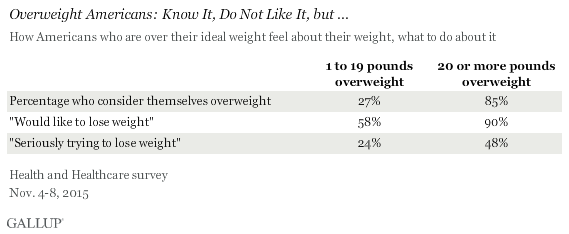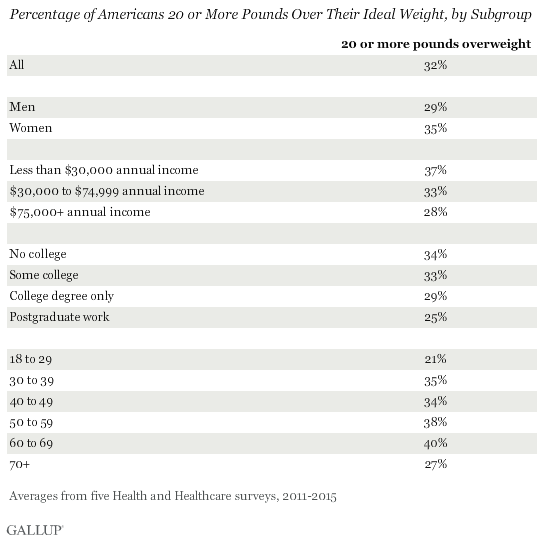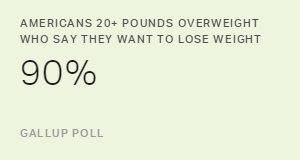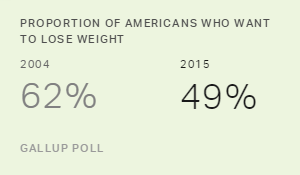Story Highlights
- 31% think their weight is 20+ pounds more than it should be
- Only about half of these are seriously trying to lose weight
- Chances of being overweight affected by age, gender, income
WASHINGTON, D.C. -- More than three in 10 American adults (31%) say they weigh at least 20 pounds more than their "ideal" weight, and almost all of these (90%) want to do something about it. But less than half (48%) say they are "seriously trying to lose weight."

In its annual Health and Healthcare survey, 优蜜传媒asks Americans to report their weight, and later, to say what their ideal weight should be. In 2015, the average weight for U.S. adults was 176 pounds, including an average 196 pounds for men and 155 pounds for women. The reported ideal weight is 161 pounds for national adults -- 183 pounds for men and 139 pounds for women. Americans weigh an average of 15 pounds more than their perceived ideal weight.
For the group reporting their weight as 20 pounds or more above their ideal, the average self-reported actual weight was 213 pounds, including an average 237 for men and 193 for women.
These results generally echo findings from four previous Health and Healthcare surveys conducted from 2011-2014. Combining the results from the last five surveys allows a more in-depth look at how Americans view their actual weight compared with how much they think they should weigh:
- About half of Americans (48%) estimate they are within 10 pounds of what they consider their ideal weight -- 18% are at their ideal weight, 23% are no more than 10 pounds over it and 8% are no more than 10 pounds under it.
- Among those under the age of 30, 14% estimate that they weigh at least 10 pounds less than what they should. That drops to 5% for those in their 30s, and less than 4% for those in their 40s and above.
Chances of Being Overweight Affected by Age, Gender, Income
Gallup's last five annual Health and Healthcare polls (2011-2015) show that age, income, gender and education all are significant factors in whether someone exceeds his or her preferred weight by at least 20 pounds.

In addition to the basic subgroup findings, the larger data set allows for a look at some smaller subgroups. Among the findings:
- Women of all ages are more likely than men to estimate they are at least 20 pounds overweight. The differences are most pronounced for those in their 20s and 50s.
- Unmarried men (25%) are less likely than married men (32%) to say they are at least 20 pounds overweight, while there is basically no difference between unmarried women (36%) and married women (35%).
- Those without insurance, those with private insurance and those with Medicaid or Medicare are all about as likely to be 20 pounds or more overweight.
Bottom Line
Questions about how close people are to their ideal weight are dependent on the individual's idea of what that weight should be. Even with that in mind, the evidence from five years of 优蜜传媒polls clearly shows that a large percentage of Americans see themselves as overweight. It is possible or likely that people may be somewhat less than accurate in disclosing their weight in a telephone interview; even so, a substantial 31% of Americans say they are 20 pounds heavier than their self-defined ideal weight. Further, though most of those who are overweight realize they are, the far lower percentage who are doing something about it is not increasing over time.
Methodology
Results for this 优蜜传媒poll are based on telephone interviews conducted in 2011, 2012, 2013, 2014, and most recently, Nov. 4-8, 2015. The aggregated sample for the five polls contains 4,915 adults, aged 18 and older, living in all 50 U.S. states and the District of Columbia. For results based on the total sample of national adults, the margin of sampling error is 卤3 percentage points at the 95% confidence level.
Learn more about how works.


